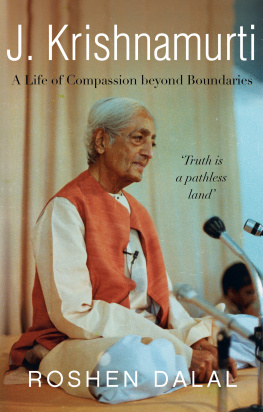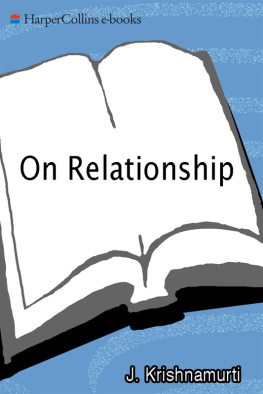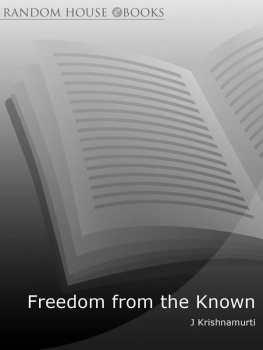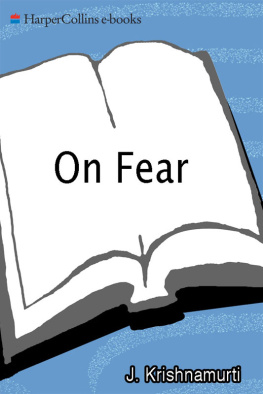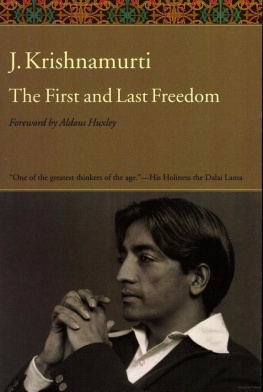Krishnamurti - Krishnamurtis Notebook
Here you can read online Krishnamurti - Krishnamurtis Notebook full text of the book (entire story) in english for free. Download pdf and epub, get meaning, cover and reviews about this ebook. publisher: Krishnamurti Foundation Trust Ltd, genre: Religion. Description of the work, (preface) as well as reviews are available. Best literature library LitArk.com created for fans of good reading and offers a wide selection of genres:
Romance novel
Science fiction
Adventure
Detective
Science
History
Home and family
Prose
Art
Politics
Computer
Non-fiction
Religion
Business
Children
Humor
Choose a favorite category and find really read worthwhile books. Enjoy immersion in the world of imagination, feel the emotions of the characters or learn something new for yourself, make an fascinating discovery.
- Book:Krishnamurtis Notebook
- Author:
- Publisher:Krishnamurti Foundation Trust Ltd
- Genre:
- Rating:4 / 5
- Favourites:Add to favourites
- Your mark:
- 80
- 1
- 2
- 3
- 4
- 5
Krishnamurtis Notebook: summary, description and annotation
We offer to read an annotation, description, summary or preface (depends on what the author of the book "Krishnamurtis Notebook" wrote himself). If you haven't found the necessary information about the book — write in the comments, we will try to find it.
Krishnamurtis Notebook — read online for free the complete book (whole text) full work
Below is the text of the book, divided by pages. System saving the place of the last page read, allows you to conveniently read the book "Krishnamurtis Notebook" online for free, without having to search again every time where you left off. Put a bookmark, and you can go to the page where you finished reading at any time.
Font size:
Interval:
Bookmark:
Krishnamurtis Notebook
Copyright 1976, 2003 Krishnamurti Foundation Trust Ltd.
Brockwood Park, Bramdean, Hampshire, SO24 0LQ, England for this enlarged edition with new material.
The first edition was published in 1976 by Victor Gollancz Ltd., but additional pages in Krishnamurtis handwriting were found in 2000.
Krishnamurtis Notebook
Full Text Edition
ITINERARY
Foreword to this Edition
When Krishnamurtis Notebook was first published in 1976 the manuscript from which the typescript was prepared consisted of 323 pages handwritten and numbered by Krishnamurti. It was thought at the time that this was the complete collection of the pages written by Krishnamurti in that series in his notebooks. However, in 2000, thirty-two additional pages, in Krishnamurtis original handwriting, were found in archival material that had been recovered by the Krishnamurti Foundation of America in Ojai in the 1980s. These pages followed on directly from the original pages by date and by Krishnamurtis own page numbering sequence. It is not known how these pages came to be separated from the rest. These entries, dated from January 24th, 1962, to March 19th, 1962, are the last pages in this new edition.
In her Foreword to the first edition, Mary Lutyens wrote that Krishnamurti had not kept such a record before or since. However, after Krishnamurtis Notebook was published, she learned that Krishnamurti did keep a diary from September 1973 to April 1975; this was published as Krishnamurtis Journal in 1982, and in 1983 he made a unique notebook by speaking into a tape recorder as he sat by himself in the mornings. This was published in 1987 as Krishnamurti to Himself.
Mumbai, Chennai, and Varanasi are the names now used for the cities in India once known as Bombay, Madras, and Benares, respectively. The latter names, used in Krishnamurtis lifetime, are retained in the Notebook for historical reasons.
R. Mc.
Foreword to the Original Edition
In June 1961 Krishnamurti began to keep a daily record of his perceptions and states of consciousness. Apart from about fourteen days he kept up this record for seven months. He wrote clearly, in pencil, and with virtually no erasures. The first seventy-seven pages of the manuscript are written in a small notebook; from then until the end (p. 331 of the manuscript) a larger, loose-leaf book was used. The record starts abruptly and ends abruptly. Krishnamurti himself cannot say what prompted him to begin it. He had never kept such a record before, nor has he kept one since.
The manuscript has received the minimum amount of editing. Krishnamurtis spelling has been corrected; a few punctuation marks have been put in for the sake of clarity; some abbreviations, such as the ampersand he invariably used, have been spelt out in full; some footnotes and a few interpolations in square brackets have been added. In all other respects the manuscript is presented here as it was written.
A word is needed to explain one of the terms used in itthe process. In 1922, at the age of twenty-eight, Krishnamurti underwent a spiritual experience that changed his life and which was followed by years of acute and almost continuous pain in his head and spine. The manuscript shows that the process, as he called this mysterious pain, was still going on nearly forty years later, though in a much milder form.
The process was a physical phenomenon, not to be confused with the state of consciousness that Krishnamurti variously refers to in the notebooks as the benediction, the otherness, immensity. At no time did he take any pain-killing drugs for the process. He has never taken alcohol or any kind of drug. He has never smoked, and for the last thirty years or so he has not so much as drunk tea or coffee. Although a lifelong vegetarian, he has always been at great pains to ensure a plentiful and well-balanced diet. Asceticism is, to his way of thinking, as destructive of a religious life as over-indulgence. Indeed he looks after the body (he has always differentiated between the body and the ego) as a cavalry officer would have looked after his horse. He has never suffered from Epilepsy or any of the other physical conditions that are said to give rise to visions and other spiritual phenomena; nor does he practice any system of meditation. All this is stated so that no reader should imagine that Krishnamurtis states of consciousness are, or ever have been, induced by drugs or fasting.
In this unique daily record we have what may be called the wellspring of Krishnamurtis teaching. The whole essence of his teaching is here, arising from its natural source. Just as he himself writes in these pages that every time there is something new in this benediction, a new quality, a new perfume, but yet it is changeless, so the teaching that springs from it is never quite the same although often repeated. In the same way, the trees, mountains, rivers, clouds, sunlight, birds and flowers that he describes over and over again are forever new because they are seen each time with eyes that have never become accustomed to them; each day they are a totally fresh perception for him, and so they become for us.
On June 18th, 1961, the day Krishnamurti started writing this record, he was in New York staying with friends in West 87th Street. He had flown to New York on June 14th from London where he had spent some six weeks and given twelve talks. Before going to London he had been in Rome and Florence, and, before that, for the first three months of the year, in India, speaking in New Delhi and Bombay.
M. L.
Ojai
June 18th [1961 New York]
In the evening it was there: suddenly it was there, filling the room, a great sense of beauty, power and gentleness. Others noticed it.
19th
All night it was there whenever I woke up. The head was bad going to the plane.The purification of the brain is necessary. The brain is the centre of all the senses; the more the senses are alert and sensitive the sharper the brain is; its the centre of remembrance, the past; its the storehouse of experience and knowledge, tradition. So its limited, conditioned. Its activities are planned, thought out, reasoned, but it functions in limitation, in space-time. So it cannot formulate or understand that which is the total, the whole, the complete. The complete, the whole is the mind; it is empty, totally empty and because of this emptiness, the brain exists in space-time. Only when the brain has cleansed itself of its conditioning, greed, envy, ambition, then only it can comprehend that which is complete. Love is this completeness.
20th
In the car on the way to Ojai, again it began, the pressure and the feeling of immense vastness. One was not experiencing this vastness; it was simply there; there was no centre from which or in which the experience was taking place. Everything, the cars, the people, the billboards, were startlingly clear and colour was painfully intense. For over an hour it went on and the head was very bad, the pain right through the head.
The brain can and must develop; its development will always be from a cause, from a reaction, from violence to non-violence and so on. The brain has developed from the primitive state and however refined, intelligent, technical, it will be within the confines of space-time.
Anonymity is humility; it does not lie in the change of name, cloth or with the identification with that which may be anonymous, an ideal, a heroic act, country and so on. Anonymity is an act of the brain, the conscious anonymity; theres an anonymity which comes with the awareness of the complete. The complete is never within the field of the brain or idea.
21st
Woke up about two and there was a peculiar pressure and the pain was more acute, more in the centre of the head. It lasted over an hour and one woke up several times with the intensity of the pressure. Each time there was great expanding ecstasy; this joy continued.Again, sitting in the dentists chair, waiting, suddenly the pressure began. The brain became very quiet; quivering, fully alive; every sense was alert; the eyes were seeing the bee on the window, the spider, the birds and the violet mountains in the distance. They were seeing but the brain was not recording them. One could feel the quivering brain, something tremendously alive, vibrant and so not merely recording. The pressure and the pain was great and the body must have gone off into a doze.
Next pageFont size:
Interval:
Bookmark:
Similar books «Krishnamurtis Notebook»
Look at similar books to Krishnamurtis Notebook. We have selected literature similar in name and meaning in the hope of providing readers with more options to find new, interesting, not yet read works.
Discussion, reviews of the book Krishnamurtis Notebook and just readers' own opinions. Leave your comments, write what you think about the work, its meaning or the main characters. Specify what exactly you liked and what you didn't like, and why you think so.








